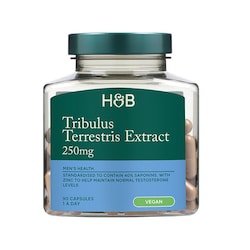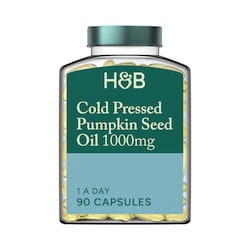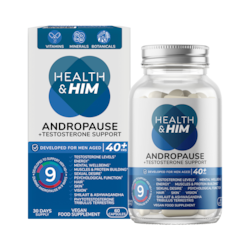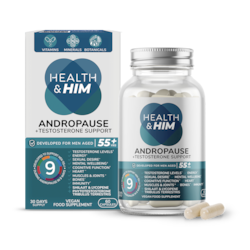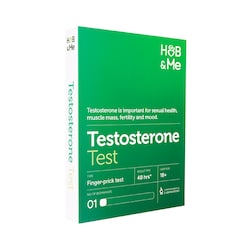15% off £30 OR 20% off £40
Code:DECIDE
Everything you need to know about male hormones

Just like women, men are loaded with hormones which affect the way they behave. The main hormone which governs a man’s appearance and behaviour is testosterone – an androgen. Find out more!
Summary
1What are male hormones?
There’s actually no such thing as ‘male hormones’. Men and women have the same hormones in their bodies. It’s where in the body these hormones are...
2Differences between male and female hormones
Men have the same hormones as women, just at different levels and affecting the body diffrently. While men do make progesterone and oestrogen...
3The male hormone cycle
When we talk about a man’s ‘cycle’, we are talking about their testosterone cycle. Men actually experience a full testosterone cycle every 24 hours...
Who knew men have a hormonal cycle too?
While we feel we know all about women’s monthly hormonal fluctuations, we rarely hear about how hormones affect men.
As it turns out, men are affected by hormonal rhythms, too, and these rhythms could be at the root of some familiar male behavioural patterns.
In this article we’ll look at male hormones, how they affect men throughout the day, as well as some causes for a hormonal imbalance in men.
What are male hormones?
There’s actually no such thing as ‘male hormones’. Men and women have the same hormones in their bodies. It’s where in the body these hormones are produced, their concentrations in the blood and the way they affect the body which are different in males and females.1,2
Oestrogen (in the form of estradiol) – functions in men include controlling libido, erectile function, and the production of sperm cells.3
In men, progesterone is needed to produce testosterone, and helps prepare the sperm for possible fertilisation, and may improve sleep.4
The most well-known male hormone, testosterone is an androgen which regulates libido and plays a role in bone mass, fat distribution, muscle mass and strength as well as sperm production.5
Best known as the hormone which stimulates breast milk production in pregnant women, men also have prolactin – albeit in much smaller quantities.
In men, prolactin is thought to help protect the central nervous system and reduce anxiety.6
Prolactin in men spikes after their partners give birth, which is thought to be associated with male paternal behaviour – or the urge to care for and comfort their child.7
Oxytocin is a chemical messenger which controls some behavioural factors, including social interactions.
It’s key for bonding in women, but in men it’s used for sperm function and testosterone production.8
Differences between male and female hormones
As previously mentioned, men have the same hormones as women, just at different levels and affecting the body in different ways.
While men do make progesterone and oestrogen, it’s their testosterone levels that are much more significant.
Men have 15 to 20 times more testosterone circulating in their bodies than women.
Men’s testosterone levels are partly responsible for what we typically consider ‘male’ physical characteristics, including increased muscle mass, strength and haemoglobin levels (which increase oxygen-carrying capacity).9
The male hormone cycle
When we talk about a man’s ‘cycle’, we are talking about their testosterone cycle.
Men actually experience a full testosterone cycle every 24 hours, with peaks and troughs in testosterone levels during this time which affect mood, attitudes and behaviour.10
Testosterone in men reaches its peak in the early morning, decreasing steadily after 9am throughout the day.11
Testosterone levels in men are at their lowest ebb at night, before sleep. Men’s testosterone levels build up overnight, which is why they’re at their highest in the early morning.12
Men over the age of 45 have less testosterone than younger men – they also tend to have steadier testosterone levels throughout the day without the morning spike.13
Summary
- Men and women have the same hormones – but at different levels which behave differently in the body
- The main hormone men have is testosterone – at around 15-20 times more than women
- Men’s testosterone production adheres to a 24 hour cycle – with levels highest in early morning
How do testosterone levels affect men?
Rise and shine
During the morning testosterone peak, men are more talkative, energetic, focused, and aggressive. They can also be more competitive, confident, and impulsive.14
However, this will also make them quicker to anger and more inclined to turn down requests for favours.
This is also the time when men are at their most virile and is the best time to tackle tasks that require spatial skills.

This is the time to:
- Take on DIY tasks
- Tackle a project alone
- Figure out the best route to somewhere
- Enjoy sex
- Not hear bad news or tackle tricky subjects
Reaching the mid-point
Around midday men are a bit more chilled out than they were in the morning – but don’t think there’s nothing left in the tank!
At this time, men are still upbeat, driven and focused, but not angered so easily. This is also a better time to work as part of a team.

This is the time to:
- Have meetings with customer or clients
- Have a team meeting or brainstorming session
- Go for a date
Bottoming out
Once we hit the evening, testosterone has well and truly dropped, men are much more low-key, passive and agreeable.
This makes it a great time to suggest things, as men are much more likely to be open to it. At this point, men’s libido is at its lowest.

This is the time to:
- Do relaxing activities such as watching a film or reading
- Enjoy some affectionate cuddling
What causes a hormonal imbalance in men?
- Older age
Testosterone levels decrease with age. This is perfectly natural and happens to all men as they get older.
Don’t panic, though – the decline is gradual at less than 2% a year from around the age of 30.15
- Type II diabetes
Type II diabetes has shown to be closely associated with lower testosterone levels in clinical studies.16
According to NHS Diabetes, 16% of males with type 2 diabetes have lower than normal levels of testosterone and an additional 24% have testosterone levels close to the border of low levels.17
- Obesity
Studies have concluded that an elevated BMI is associated with reduced total testosterone levels in men.18
There is a particular link between low testosterone and abdominal obesity.19
This is the fat which accumulates around a man’s waist and can include both visceral fat (fat deep inside the abdominal cavity) and subcutaneous fat (the soft fat we see just under the skin).
- Lack of sleep
Testosterone builds at night, during REM sleep. Therefore, poor quality sleep reduces testosterone levels.20
One study on young, healthy men restricted their sleep from 8 hours 55 minutes per night to 4 hours 48 minutes per night.
Testosterone levels in the men were found to be much lower after sleep restriction than after the restful night’s sleep.21
Handpicked content: The importance of sleep
- Stress
Testosterone levels are known to reduce when a man is under stress.
This includes both psychological stress such as fear and anxiety and physical and actual stress such as pain.22
Further, research has also found that anticipatory stress – such as worrying about a future event – can also reduce testosterone levels in men.23
Handpicked content: How to relax
Summary
- In the morning, higher testosterone levels mean men are more talkative, energetic, aggressive and sexually virile
- By afternoon, men are focused yet mellow – perfect for teamwork
- When evening comes, men are more passive and relaxed due to lowering testosterone levels
- Various factors cause lower testosterone levels in men, including age, type II diabetes, obesity, lack of sleep and stress

High oestrogen in men
In men, oestrogen is important for controlling libido, erectile function, and the production of sperm cells.24
However, too-high levels in men can cause hormonal imbalance.
High oestrogen in men may be caused by obesity.25
Symptoms of high oestrogen levels in men include:26
- reduced sperm production
- breast tissue growth
- erectile dysfunction
Is the male menopause real?
We’ve all heard of the female menopause – a collection of symptoms commonly experienced by women during middle age – which are caused by the natural drop in oestrogen.27
The so-called ‘male menopause’ refers to a collection of symptoms commonly experienced by some men around middle age.28
This isn’t necessarily caused by a drop in testosterone levels, however as the drop isn’t hugely significant. Once they’ve peaked, a man’s total testosterone levels fall at an average of 1.6% per year.29
Symptoms of the male menopause include:30
- Depression
- Loss of sex drive
- Erectile dysfunction
- Mood swings and irritability
- Loss of muscle mass and reduced ability to exercise
- Fat redistribution, such as developing a large belly or "man boobs"
- A general lack of enthusiasm or energy
- Difficulty sleeping or increased tiredness
- Poor concentration and short-term memory
HRT for men
HRT (hormone replacement therapy) is a process where artificial hormones are introduced to the body, in order to boost their levels and usually address various hormone-related symptoms.
HRT for men is marketed by some private medical companies, especially in the USA, as a solution to common concerns faced by men as they age, low energy and a lack of libido. However, medical experts are undecided as to whether this is harmful or helpful.34
For men, the hormone which is added during HRT is testosterone. HRT for men is also called testosterone replacement therapy or TRT.
HRT for men involves taking a regular injection, gel or tablet which boosts levels of testosterone in the body.32
- To correct low testosterone levels
HRT might be suitable for men who experience hypogonadism – where they produce unusually low levels of testosterone.33
- To boost age-related testosterone decline
HRT for men is marketed by some private medical companies, especially in the USA, as a solution to common concerns faced by men as they age, low energy and a lack of libido. However, medical experts are undecided as to whether this is harmful or helpful.34 In the UK, HRT for men is usually prescribed following a male hormone test to confirm low levels of testosterone.35
In some cases, such as in men experiencing prostate cancer, it may be necessary to reduce the amount of testosterone produced by the body. This is usually done by injections, an implant under the skin or with tablets.36
- To help treat a disease
In some cases, such as in men experiencing prostate cancer, it may be necessary to reduce the amount of testosterone produced by the body. This is usually done by injections, an implant under the skin or with tablets.36Summary
- High oestrogen in men may lead to affected sperm production, breast tissue growth and erectile dysfunction.
- Testosterone does drop off with age, but only by about 1.6% each year after age 30.
- HRT for men usually involves taking extra testosterone, but isn’t suitable for everyone.
Last updated: 2 July 2021
- https://www.hindawi.com/journals/ije/2018/4847376/
- https://pubmed.ncbi.nlm.nih.gov/9393999/
- https://www.ncbi.nlm.nih.gov/pmc/articles/PMC4854098/
- https://pubmed.ncbi.nlm.nih.gov/15669543/
- https://www.nih.gov/news-events/nih-research-matters/understanding-how-testosterone
- https://themenshealthclinic.co.uk/prolactin-mans-friend-or-foe/
- https://www.ncbi.nlm.nih.gov/pmc/articles/PMC4970346/
- https://www.hormone.org/your-health-and-hormones/glands-and-hormones-a-to-z/hormones/
- https://www.ncbi.nlm.nih.gov/pmc/articles/PMC6391653/
- https://www.myhormonology.com/learn/male-hormone-cycle/
- https://www.ncbi.nlm.nih.gov/pmc/articles/PMC4501456/
- https://www.ncbi.nlm.nih.gov/pmc/articles/PMC4445839/
- https://www.ncbi.nlm.nih.gov/pmc/articles/PMC4501456/
- www.myhormonology.com/male-hormone-cycle/
- https://www.nhs.uk/conditions/male-menopause/
- https://bjui-journals.onlinelibrary.wiley.com/doi/abs/10.1111/j.1464-410X.2007.07022.x
- https://www.diabetes.co.uk/low-testosterone-and-diabetes.html
- https://www.urologytimes.com/view/testosterone-levels-show-steady-decrease-among-young-us-men
- https://pubmed.ncbi.nlm.nih.gov/1778664/
- https://www.ncbi.nlm.nih.gov/pmc/articles/PMC4445839/
- https://www.ncbi.nlm.nih.gov/pmc/articles/PMC4445839/
- https://www.ncbi.nlm.nih.gov/pmc/articles/PMC5128352/
- https://www.ncbi.nlm.nih.gov/pmc/articles/PMC5128352/
- https://www.ncbi.nlm.nih.gov/pmc/articles/PMC4854098/
- https://academic.oup.com/jcem/article-abstract/48/4/633/2678987?redirectedFrom=PDF
- https://www.gleneagles.com.sg/healthplus/article/testosterone-oestrogen
- https://www.nhs.uk/conditions/menopause/
- https://www.nhs.uk/conditions/male-menopause/
- https://www.ncbi.nlm.nih.gov/pmc/articles/PMC2544367/
- https://www.nhs.uk/conditions/male-menopause/
- https://www.ncbi.nlm.nih.gov/pmc/articles/PMC3255409/
- https://www.health.harvard.edu/mens-health/is-testosterone-therapy
- https://www.ncbi.nlm.nih.gov/pmc/articles/PMC2544367/
- https://www.health.harvard.edu/mens-health/is-testosterone-therapy
- https://balancemyhormones.co.uk/trt-uk/
- https://prostatecanceruk.org/prostate-information/treatments/hormone-therapy
The advice in this article is for information only and should not replace medical care. Please check with your GP or healthcare professional before trying any supplements, treatments or remedies. Food supplements must not be used as a substitute for a varied and balanced diet and a healthy lifestyle.









